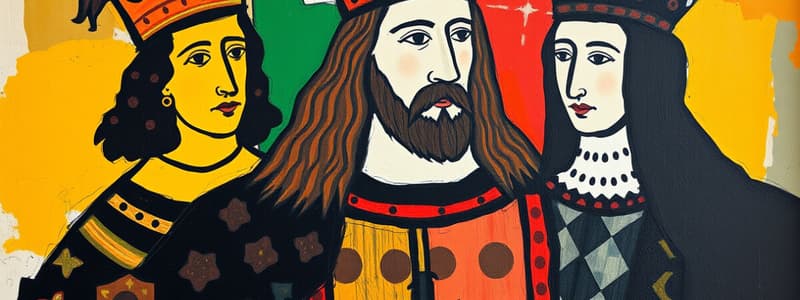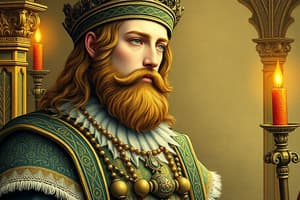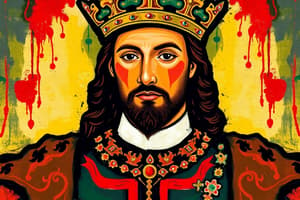Podcast
Questions and Answers
What prevented Henry VII from becoming king upon his birth?
What prevented Henry VII from becoming king upon his birth?
An Act of Parliament barred descendants of John of Gaunt's marriage to Katherine Swynford from becoming king or queen.
Which king reigned when Henry VII was born, and what was the political situation at that time?
Which king reigned when Henry VII was born, and what was the political situation at that time?
Henry VI reigned when Henry VII was born, and the crown was unstable due to ongoing power struggles.
What were the Wars of the Roses and who were the two main houses involved?
What were the Wars of the Roses and who were the two main houses involved?
The Wars of the Roses were conflicts between the House of York and the House of Lancaster.
What significant event occurred at the Battle of Tewksbury in 1471?
What significant event occurred at the Battle of Tewksbury in 1471?
Who was Henry VII's father and what was notable about his lineage?
Who was Henry VII's father and what was notable about his lineage?
What was Edward IV's ultimate goal concerning the House of Lancaster?
What was Edward IV's ultimate goal concerning the House of Lancaster?
How did Henry IV manage to escape capture on his journey back to England?
How did Henry IV manage to escape capture on his journey back to England?
What significant event took place at Bosworth Field in 1485?
What significant event took place at Bosworth Field in 1485?
Describe the basic structure of English society during the Tudor period.
Describe the basic structure of English society during the Tudor period.
What role did landowners play in rural society during the 15th century?
What role did landowners play in rural society during the 15th century?
Flashcards are hidden until you start studying
Study Notes
Henry VII and His Path to the Throne
- Henry VII's ancestry included Margaret Beaufort, descended from John of Gaunt, Duke of Lancaster, linked to King Edward III.
- Despite royal blood, Henry was barred from the throne due to Parliament's Act against Beaufort descendants.
- His father, Edmund Tudor, had ties to Katherine of Valois, reinforcing Henry's tenuous claim to the throne.
- Born in 1457, Henry VI reigned, making Henry VII's rise to kingship unlikely.
- The Wars of the Roses (1455–1487) were a series of conflicts between the Houses of York and Lancaster for the English crown.
- Edward IV temporarily overthrew Henry VI in 1461, but Henry VI regained power in 1470 before losing it again in 1471.
- Edward IV's victory at the Battle of Tewkesbury led to Henry VI's murder in prison, extinguishing the Lancastrian claim.
- In 1471, Henry and his uncle Jasper fled to Brittany as refugees due to threats to their lives.
- Henry's attempts to return were unsuccessful until Edward IV's death in 1483, which triggered a power struggle.
- Richard III usurped the throne from Edward V, alarming both Yorkists and Lancastrians.
- Henry's secure path to the throne was facilitated by his mother's and Edward IV's wife’s collaboration to gain French support.
- On August 6, 1485, Henry landed in Wales with French mercenaries and garnered local support before the Battle of Bosworth.
- Henry's forces defeated Richard III, marking the end of the Wars of the Roses and establishing him as King.
Society and Social Structure (1485 - 1558)
- 15th and 16th century England had a broad class divide resembling modern class structures, albeit more rigid.
- The feudal system began to break down, leading to a more diverse social hierarchy of peasants, gentry, and nobility.
- The majority of the population lived in rural areas, with land owned by the nobility and gentry, who held local law enforcement responsibilities.
- The nobility was few in number, often owning extensive land without residing there.
- Gentry families, such as the Pakingtons, provided local governance, often residing on their lands.
- The bottom of the social hierarchy included skilled workers and unskilled laborers, with vagrancy viewed negatively by society.
- Towns differed from the countryside, housing around 10-20% of the population and featuring a more fluid class structure based around citizenship and trades.
- Emerging middle classes developed through skilled professions, contrasting with the more static countryside social structure.
England's Global Standing (1485)
- In 1485, England was minor compared to powerful European entities like France and Spain.
- English powers lagged in wealth, military strength, and global aspirations, focusing instead on internal issues.
- England had claims to parts of France, but these were not realistically actionable post-Wars of the Roses.
Religion's Role in Tudor Society
- Roman Catholicism dominated English spiritual life, with the Pope seen as a direct link to God.
- The Church organized community life, influencing many aspects including education, charity, and social gatherings.
- Frequent holy days and community events were synonymous with Church involvement, demonstrating its centrality in everyday life.
Economic Structure and Industry (15th and 16th Century)
- The economy was heavily reliant on agriculture, with a majority of the population engaged in farming.
- Wool production for cloth was a vital industry, with significant exports primarily trading through the Low Countries.
- Industrial development was limited; society remained predominantly pre-industrial focusing on subsistence agriculture.
Legacy of the Wars of the Roses
- The Wars of the Roses highlighted the power of the nobility, capable of raising private armies which challenged royal authority.
- The resulting shift in power dynamics led to Henry VII's ascension, marking the beginning of the Tudor dynasty and impacting governance and nobility relations in England.
Studying That Suits You
Use AI to generate personalized quizzes and flashcards to suit your learning preferences.




